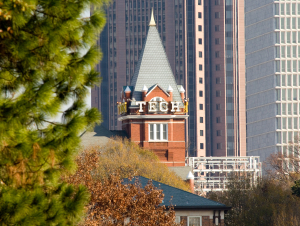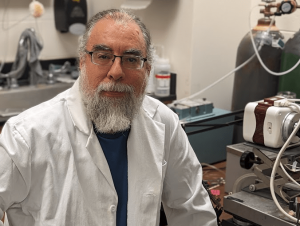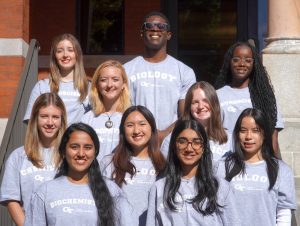Latest News
How do you know anything is real? Some things you can see directly, like your fingers. Other things, like your chin, you need a mirror or a camera to see. Other things can’t be seen, but you believe in them because a parent or a teacher told you, or you read it in a book.
The AI4Science Center's seed grant aims to support the development of research projects centered on innovation and collaboration.
Physics Professor Flavio Fenton has been named a Bill Kent Family Foundation AI in Higher Education Faculty Fellow. The fellowship supports faculty projects that explore innovative, ethical, and impactful uses of AI in teaching and learning.
Congratulations to the inaugural class of College of Sciences undergraduate student ambassadors!
Events
Fossil Friday
Join the Spatial Ecology and Paleontology Lab for Fossil Fridays! Become a fossil hunter and help discover how vertebrate communities have changed through time.
School of Physics Spring Colloquium Series- Dr. Andrea Young
Dr. Andrea Young(UCSB) Superconductivity and magnetism in crystalline graphite allotropes
School of Physics Spring Colloqium Series - Dr. Andrea
Superconductivity and magnetism in crystalline graphite allotropes
CRA SEMINAR | Dr. Claig Pellegrino | NASA Goddard | Host: Prof. Tamara Bogdanovic
CRA SEMINAR | Dr. Claig Pellegrino | NASA Goddard | Host: Prof. Tamara Bogdanovic
Fossil Friday
Join the Spatial Ecology and Paleontology Lab for Fossil Fridays! Become a fossil hunter and help discover how vertebrate communities have changed through time.
Special CRA SEMINAR| Prof. Chad Hanna | Penn State University | Host: Dr. Surabhi Sachdev
Special CRA SEMINAR| Prof. Chad Hanna| Penn State University| Host: Dr. Surabhi Sachdev
What Can I Do with My Georgia Tech Sciences Degree: Industry Panel
During this event, College of Sciences alumni will share best practices, lessons learned, and practical advice on successfully making the transition from traditional academic pathways to industry.
Experts in the News
In an article published in Physics Magazine, School of Physics Ph.D. student Jingcheng Zhou and Assistant Professor Chunhui (Rita) Du review efforts to optimize diamond-based quantum sensing. According to Zhou and Du, the approach used in two recent studies broadens the potential applications of nitrogen-vacancy center sensors for probing quantum phenomena, enabling measurements of nonlocal properties (such as spatial and temporal correlations) that are relevant to condensed-matter physics and materials science.
Physics Magazine 2025-07-14T00:00:00-04:00Researchers at the Georgia Institute of Technology and India's National Center for Biological Sciences have found that yeast clusters, when grown beyond a certain size, spontaneously generate fluid flows powerful enough to ferry nutrients deep into their interior.
In the study, "Metabolically driven flows enable exponential growth in macroscopic multicellular yeast," published in Science Advances, the research team — which included Georgia Tech Ph.D. scholar Emma Bingham, Research Scientist G. Ozan Bozdag, Associate Professor William C. Ratcliff, and Associate Professor Peter Yunker — used experimental evolution to determine whether non-genetic physical processes can enable nutrient transport in multicellular yeast lacking evolved transport adaptations.
A similar story also appeared at The Hindu.
Phys.org 2025-06-24T00:00:00-04:00Other planets, dwarf planets and moons in our solar system have seasonal cycles — and they can look wildly different from the ones we experience on Earth, experts told Live Science.
To understand how other planets have seasons, we can look at what drives seasonal changes on our planet. "The Earth has its four seasons because of the spin axis tilt," Gongjie Li, associate professor in the School of Physics, told Live Science. This means that our planet rotates at a slight angle of around 23.5 degrees.
"On Earth, we're very lucky, this spin axis is quite stable," Li said. Due to this, we've had relatively stable seasonal cycles that have persisted for millennia, although the broader climate sometimes shifts as the entire orbit of Earth drifts further or closer from the sun.
Such stability has likely helped life as we know it develop here, Li said. Scientists like her are now studying planetary conditions and seasonal changes on exoplanets to see whether life could exist in faroff worlds. For now, it seems as though the mild seasonal changes and stable spin tilts on Earth are unique.
Live Science 2025-05-05T00:00:00-04:00Biofilms have emergent properties: traits that appear only when a system of individual items interacts. It was this emergence that attracted School of Physics Associate Professor Peter Yunker to the microbial structures. Trained in soft matter physics — the study of materials that can be structurally altered — he is interested in understanding how the interactions between individual bacteria result in the higher-order structure of a biofilm
Recently, in his lab at the Georgia Institute of Technology, Yunker and his team created detailed topographical maps of the three-dimensional surface of a growing biofilm. These measurements allowed them to study how a biofilm’s shape emerges from millions of infinitesimal interactions among component bacteria and their environment. In 2024 in Nature Physics, they described the biophysical laws that control the complex aggregation of bacterial cells.
The work is important, Yunker said, not only because it can help explain the staggering diversity of one of the planet’s most common life forms, but also because it may evoke life’s first, hesitant steps toward multicellularity.
Quanta Magazine 2025-04-21T00:00:00-04:00Postdoctoral researcher Aniruddha Bhattacharya and School of Physics Professor Chandra Raman have introduced a novel way to generate entanglement between photons – an essential step in building scalable quantum computers that use photons as quantum bits (qubits). Their research, published in Physical Review Letters, leverages a mathematical concept called non-Abelian quantum holonomy to entangle photons in a deterministic way without relying on strong nonlinear interactions or irrevocably probabilistic quantum measurements.
Physics World 2025-04-09T00:00:00-04:00Peter Yunker, associate professor in the School of Physics, reflects on the results of new experiments which show that cells pack in increasingly well-ordered patterns as the relative sizes of their nuclei grow.
“This research is a beautiful example of how the physics of packing is so important in biological systems,” states Yunker. He says the researchers introduce the idea that cell packing can be controlled by the relative size of the nucleus, which “is an accessible control parameter that may play important roles during development and could be used in bioengineering.”
Physics Magazine 2025-03-21T00:00:00-04:00





